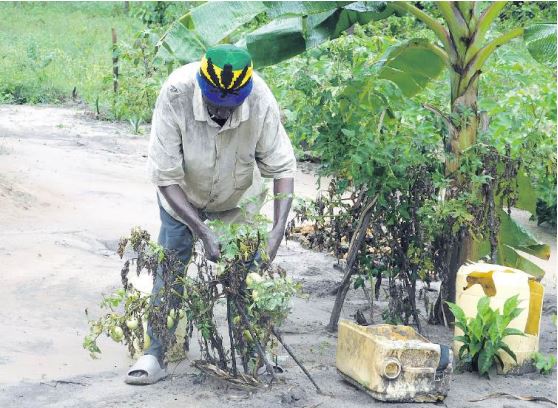
For 53-year-old Musyoki Maingi, a modest mud-walled house with an iron sheet roof is more than just a home; it’s a symbol of freedom, dignity and long-awaited independence.
After spending decades without a place to call his own, Maingi now sits comfortably under his veranda in Fingirika, Msambweni subcounty, watching the rainfall with a quiet smile.
“I call it a gift from God,” he said simply, but his journey has been anything but.
Maingi’s life took a dramatic turn when Australian mining company, Base Titanium resettled families in Kwale county to pave the way for mining operations.
Originally from Vumbu village, Maingi was not initially among the directly affected households in the titanium mining operations.
However, recognising his vulnerability, Base Titanium made the decision to include him in their resettlement programme, an act that gave Maingi a second chance at life.
At least 44 households were affected in Vumbu, and benefitted from relocation.
For years, Maingi lived with his aunt in Vumbu, working as a caretaker and depending heavily on the family for more than 10 years, he said.
“I had no land, no steady income and no hope of starting my own family,” he said.
However, that changed when he was given a plot, a home and the support he needed to stand on his own.
Today, Maingi owns not one but two homes. Though made of mud and iron sheets, they are built with pride, he said.
“I am happy because I no longer have to depend on anyone. This is my home, and I can finally call it mine,” he said.
Farming, long a part of his heritage is now his livelihood. On his land, Maingi grows tomatoes, cassava, guavas, maize, oranges and vegetables.
The steady harvests every three months not only feed his household but also provide an income through local market sales.
A personal highlight is the borehole he managed to sink, which supplies water for both irrigation and domestic use, ending years of walking long distances for water.
“I’m very grateful that I can now farm all year round. Back then, I had to wait for the rains, which were never reliable. Now, I can plan, plant and harvest with confidence,” he said.
Livestock, once a distant dream, now roam his compound, a sign of his growing independence and financial stability.
“They provide food and extra income. I never imagined I could get here,” Maingi said.
This newfound stability has also given him the courage to take another big step, starting a family of his own.
“I avoided marriage for a long time because I couldn’t support a wife or children. But now, I feel ready,” he said.
Maingi now lives with a partner and dreams of raising children, passing on what he has built, and creating a legacy rooted in resilience and hope.
Base Titanium’s external affairs manager Dr Melba Wasunna commended the success of the resettlement programme and the compassion that guided its implementation.
“This initiative is more than physical relocation, it’s about restoring dignity and providing real opportunities,” Wasunna said.
“The work of the resettlement and compensation committee has been key in identifying the vulnerable and ensuring no one is left behind.”
She emphasised that strong collaboration between stakeholders and communities, rooted in compassion and inclusion, has been vital.
“This is about shared value. Our company has been able to offer vulnerable individuals the tools and opportunities they need to build stable, self-sufficient lives. When the community thrives, we all benefit,” she said.
Christine Mwaka, Base Titanium’s social engagement manager, reaffirmed the company’s commitment to fulfilling its promise of improving the lives of local communities.
She added that many beneficiaries, like Maingi, had previously lived without land or a permanent home.
“We recognised caretakers, landless workers and even squatters who are often left out of formal programmes. We ensured they too received land, housing and legal ownership, tools to anchor their futures,” Mwaka said.
Mwaka encouraged the beneficiaries to safeguard what they’ve gained. She also offered advice to beneficiaries.
“Don’t sell your land or houses. These are assets for you and future generations. Use them wisely to ensure sustained growth,” she said.
Mwaka claimed Base Titanium has followed international best practices while relocating more than 1,000 households since they started mining in Kwale.
The company, she said, was guided by Kenya Mining Act 2016 and International Finance Corporation performance standard number five on involuntary resettlement.
According to the company, it has spent more than Sh3.5 billion for the last three resettlement programmes which includes Mafisini in 2021, Kwale North and Bumamani in 2022 and Vumbu households in 2024.









![[PHOTOS] OCS Samson Talam’s day in court](/_next/image?url=https%3A%2F%2Fcdn.radioafrica.digital%2Fimage%2F2025%2F06%2F458bc8b8-2cb6-4276-84d0-8f30cf301f52.jpg&w=3840&q=100)

